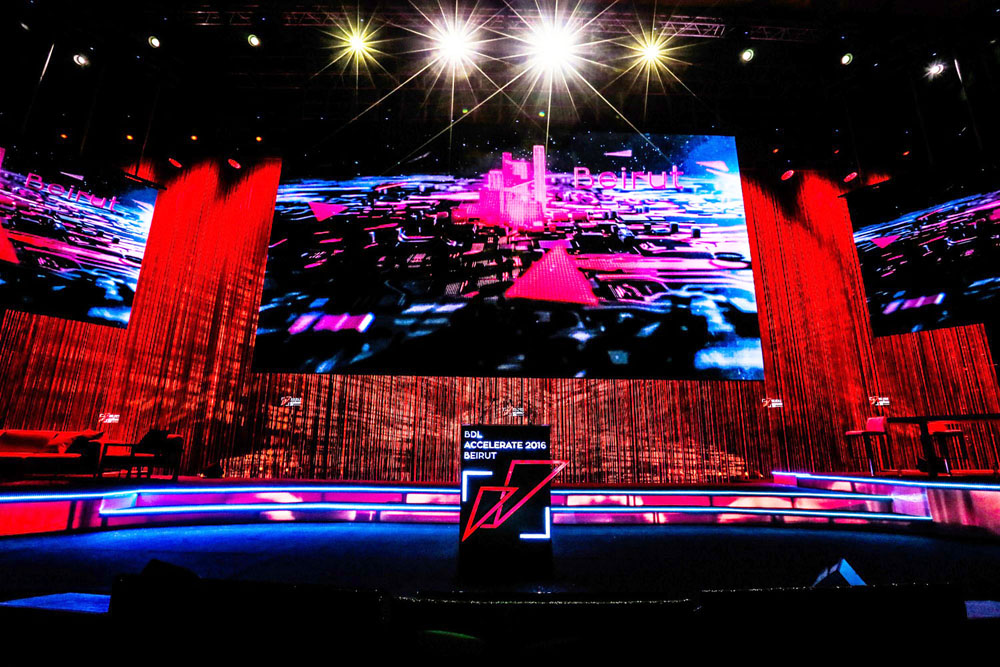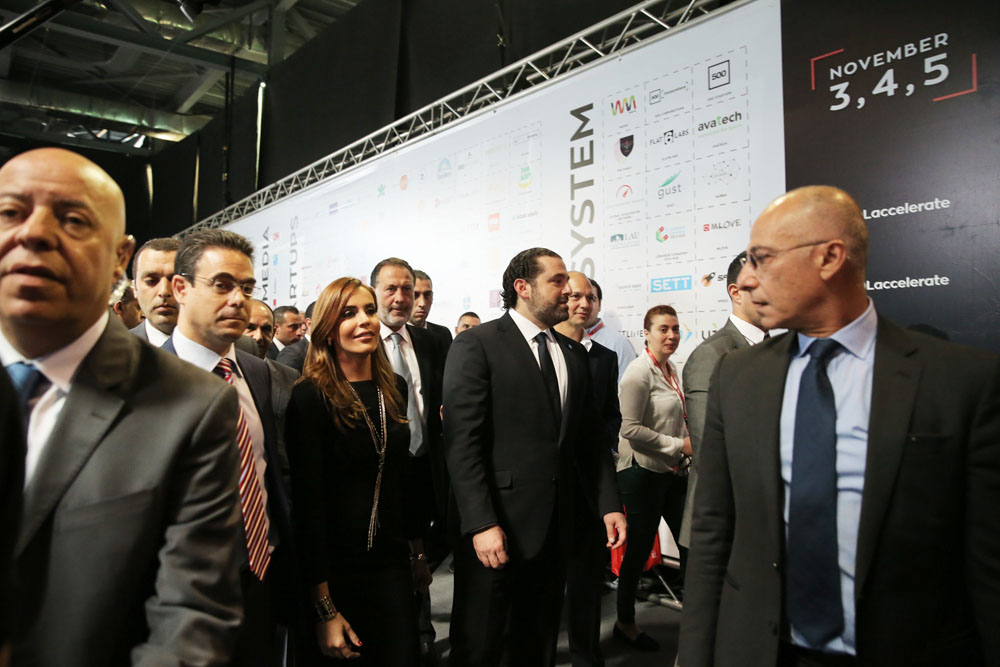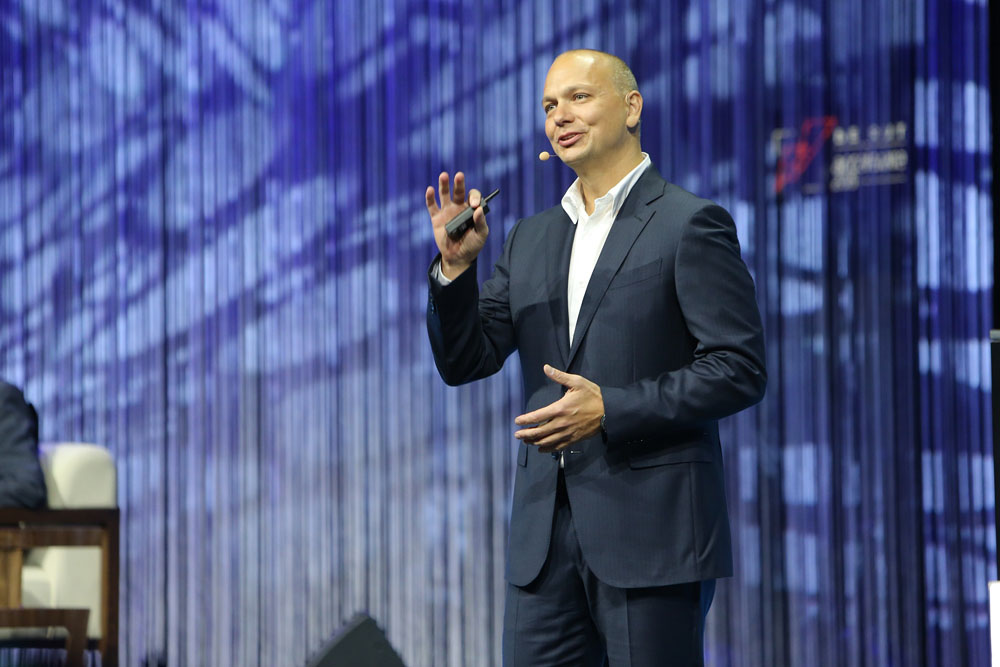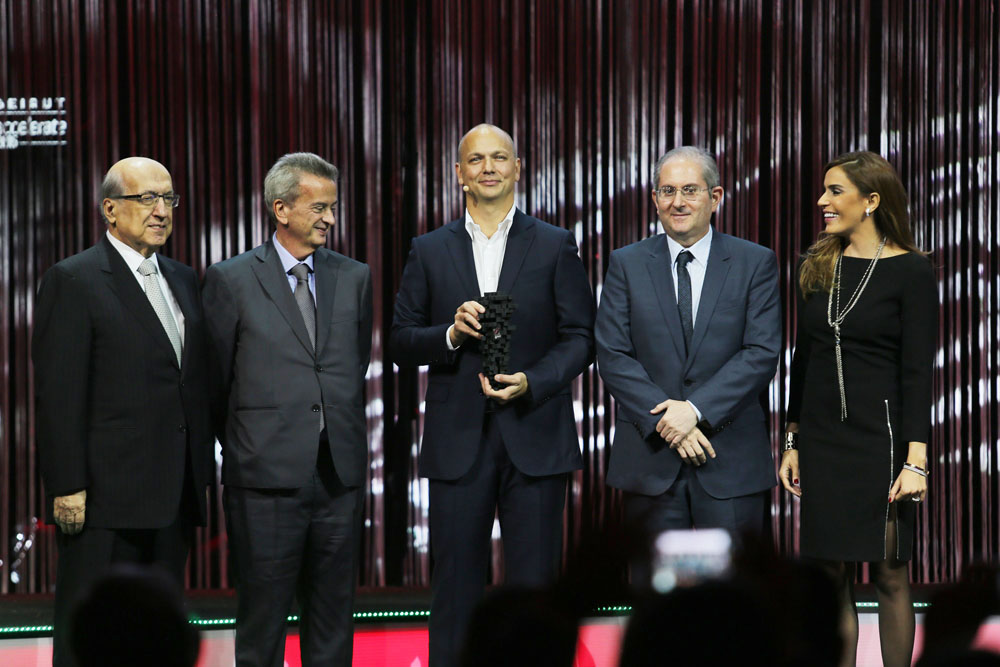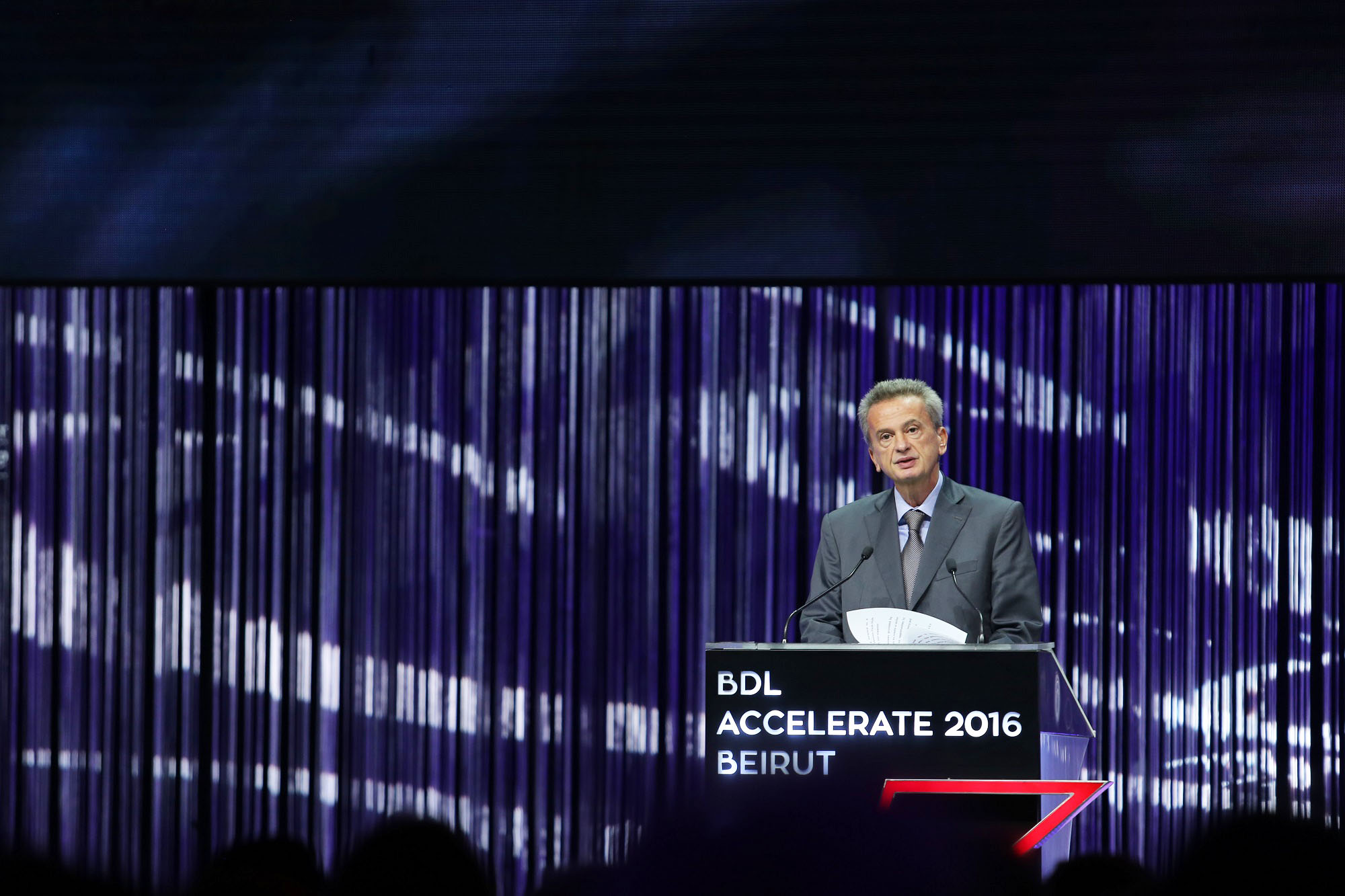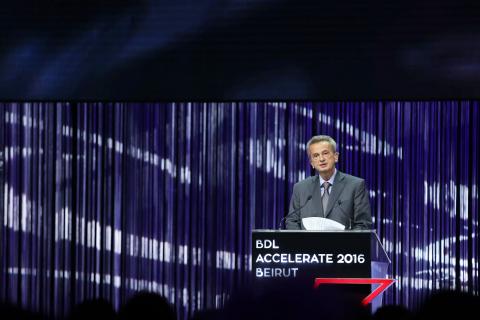
Banque du Liban – The Central Bank of Lebanon launched Lebanon’s third annual international conference, “BDL Accelerate 2016” on Thursday November 3rd, 2016 at Forum de Beyrouth. The biggest and most influential conference on the Mediterranean and in the MENA region took place for three days and gathered the most important personalities and international speakers till its last day, on Saturday November 5th, 2016.
This year, 20,000 attendees from all over the world, with over 1,000 internationals, 4,000 professionals, 3,000 entrepreneurs and 2,000 students, participated in the conference and interacted in discussions, dialogues and conferences spread over 9 platforms. The first headline speaker for “Banque du Liban Accelerate 2016” was Steve "The Woz" Wozniak, the Silicon Valley icon who founded Apple with Steve Jobs. Tony Fadell, the Lebanese Founder and CEO of Nest company bought by Google for billions of dollars was also a speaker during the event, talking about his achievements in the innovation and technology world.
The conference debuted with a speech for Mrs. Marianne Hoayek, Director of the Governor’s Executive Office of the Central Bank of Lebanon, and the founder and Organizer of BDL Accelerate 2016, who welcomed all attendees and stressed over the importance of BDL Accelerate 2016 which boosted, from its first edition, the knowledge economy in Lebanon and established and developed a large number of startups. Mrs. Hoayek said that this conference follows the execution of circular 331 issued by the Central Bank of Lebanon three years ago, that aims to push banks to invest in startups. She also mentioned all steps and procedures taken by the Governor of the Central Bank Mr. Riad Salamé three years ago to support this sector.
The Governor of the Central Bank, Mr. Riad Salamé, pronounced after that a speech saying: “Our gathering for the third year confirms the interest that we all have in building up the sector of knowledge economy, a sector that will play a key role in the economy and the future of Lebanon. The success we encountered when we created synergies between bankers and entrepreneurs, with a view to develop the knowledge sector, has contributed to the emergence of new accelerators and incubators, as well as to the emergence of funds and many startup companies.”
Mr. Salamé assured that the purpose of the guarantees provided by Banque du Liban to banks is to create a sector that will offer employment opportunities to the Lebanese and will foster the efficiency and competitiveness of the Lebanese economy. The financial environment in the region has changed. The risks have increased, while the availability of foreign currencies has decreased. From this perspective, it was important for our financial and monetary stability to address this new environment and reverse the trend, by decreasing the risks and increasing the availability of foreign currencies.”
At the end of his speech, Mr. Salamé invited entrepreneurs and innovators to leverage Lebanon’s name worldwide saying: “Lebanon is a resilient country. The Lebanese have gone through hardships. They have endured wars and political crises that would have destroyed the economy of many other nations. Yet, we kept building up our economy. It is with that strength and with that determination that we will build together the sector of the knowledge economy.”
As for Dr. Jospeh Torbey, Chairman of the Association of Banks in Lebanon, he saluted in his speech the initiative led by the Governor of the Central Bank of Lebanon, Mr. Riad Salamé, in promoting startups to modernize and boost up the Lebanese economy. And after expressing the Lebanese banking sector’s pleasure in the election of a new president for the republic, Dr. Torbey said: “We remain hopeful that this new operating environment once it gains momentum would provide considerable support to Lebanese entrepreneurs, SMEs and startup companies. Raising awareness of the importance and potential role of establishing small firms accentuated in the last few years, and initiatives aimed at encouraging invention and innovation at schools, universities and other places in the form of organizing competitions and offering awards multiplied as well.” He continued by saying “Venture capital firms have been active in establishing funds and have raised so far considerable amount of money to help financing capital seeking startups in the information and communications technology and in other creative industries. They have also developed their work to help entrepreneurs translate their new ideas into products, processes and services.” At the end, Dr. Torbey invited all parties concerned with startups to seize the opportunity to elaborate visions and develop new businesses for the development of the communities and economies where they operate.
Mr. Nicolas Chammas, Chairman of the Beirut Traders Association and President of Massachusetts Institute of Technology (MIT) Alumni Association, praised the circular 331 issued by Banque du Liban, that helped Knowledge Economy rise today in Lebanon and that eased the participation of entrepreneurs, accelerators, universities, investors and bank systems on one platform, the Ecosystem which is the base of Knowledge Economy. Circular 331 is contributing also in supporting startups and funding new startups valued for approximately 500 million dollars. In his speech, Mr. Chammas compared the political and economic sectors saying that “politicians think small and spread negativity among all citizens, whereas entrepreneurs think big and spread hope by expanding their business. Politicians create an economy that serves them, but entrepreneurs aim to establish an economy that serves all.” Mr. Chammas encouraged entrepreneurs to persevere and expand their investments and business and he spoke about his experience in being the 122th president of the MIT Alumni Association, and about managing it from 10000 km2 away since it is located in the United States. He spoke about the focus of MIT on the current challenges like preserving the environment, fight, stop and find treatments to incurable diseases like Alzheimer and spread digital technology.
The Lebanese inventor of the iPod and iPhone and the founder of Nest company, Mr. Tony Fadell wrapped up the opening ceremony by talking about his childhood memories in Zahle, Lebanon where his dream of leveraging Lebanon’s name worldwide was born. From his point of view, Lebanon is an exporter of capacities in several domains especially the business field. Mr. Fadell said that his success abroad is Lebanon’s success. And after the speeches, Mrs. Hoayek handed Mr. Fadell a trophy from “BDL Accelerate 2016”, in the presence of the Governor Mr. Riad Salamé, Dr. Joseph Torbey Chairman of the Association of Banks in Lebanon and Mr. Nicolas Chammas, Chairman of the Beirut Traders Association and President of Massachusetts Institute of Technology (MIT) Alumni Association.
After the opening ceremony, Mr. Fadell held a debate with all attendees where he shared his experience in the world of startups and the sector of technology, and gave tips about founding startups.
The Prime Minister-designate, Mr. Saad Hariri surprised the audience with an appearance at BDL Accelerate, where he visited with Mrs. Hoayek and Mr. Fadell all startups and exhibitors.
Governor's speech at BDL Accelerate 2016
I would like to welcome you to BDL Accelerate. Our gathering for the third year confirms the interest that we all have in building up the sector of knowledge economy, a sector that will play a key role in the economy and the future of Lebanon.
Welcome to our foreign guests. I hope that their participation will enrich the Conference and that their visit will be enjoyable.
We are pleased to see that, in our region; other countries have followed our path and are putting in place funding schemes to develop the digital economy.
This will widen the sector and deepen its market.
The success we encountered when we created synergies between bankers and entrepreneurs, with a view to develop the knowledge sector, has contributed to the emergence of new accelerators and incubators, the latest being smart ESA, as well as to the emergence of funds and many startup companies.
We are encouraged by the results and we intend to pursue our efforts.
For instance, we are looking forward to a further expansion of the UK Lebanon Tech Hub that was initially created with our support.
The purpose of the guarantees provided by Banque du Liban to banks is to create a sector that will offer employment opportunities to the Lebanese and will foster the efficiency and competitiveness of the Lebanese economy.
The success of entrepreneurs in Lebanon is a success for all Lebanese.
Using the funding provided under Circular 331, and taking advantage of BDL guarantee, implies that your companies have to be Lebanese companies operating in Lebanon. The banks initiating the investments have to make sure that the funds invested by them are compliant with the Circular.
I believe that technology is like music. Both have no borders. But musical composers, like tech companies, have a nationality.
So create and produce in Lebanon, then export, in the best suitable way, throughout the region and the world.
Banque du Liban is taking initiatives to develop the Lebanese digital sector by banking on international cooperation. Contacts with the USA, the UK, Canada and France are already taking place. We hope that our approach will enhance this promising sector.
We have increased the margin of funds that banks could dedicate to the financing of the digital sector, by authorizing them to invest, with our guarantee, up to 4% of their own funds in this sector, compared to 3% previously.
I hope that banks and entrepreneurs will make the best use of these funds.
More funds will be available for the digital sector, since the own funds of banks will be growing faster, as a result of the Central Bank last financial engineering.
The financial environment in the region has changed. The risks have increased, while the availability of foreign currencies has decreased.
From this perspective, it was important for our financial and monetary stability to address this new environment and reverse the trend, by decreasing the risks and increasing the availability of foreign currencies.
Banque du Liban has succeeded, thanks to its financial engineering, in attracting billions of dollars to Lebanon. This has impacted the balance of payments that became positive, turning a cumulative deficit of 1.7 billion USD in May 2016 into a surplus of 555 million USD in September 2016.
Banks deposits have grown at a faster pace. This year and up to April 2016, deposits grew by 0.9%, compared with a growth of 2.5% after the financial engineering. On an annual basis, they rose from 2% to 5%. Banks have strengthened their balance sheet, which will enable them to keep expanding their credit portfolio, especially in Lebanese pound, to back the economic activity, while complying with the new international capital and risk requirements.
We are talking here about new loans in Lebanese pound and not about the conversion of existing loans in dollars into Lebanese pound.
BDL foreign assets have reached a historical record level above 40 billion USD. This confers stability to the Lebanese pound and to interest rates.
Foreign financial institutions showed more interest in our sovereign papers, and the purchase operations carried out by foreign investment funds have exceeded four billion dollars at current interest rates.
I want to congratulate the BDL Accelerate team and Miss Marianne Hoayek for their efforts to make a success out of this event.
The election of President Aoun should lead to a normal activity of the Constitutional Institutions, thus increasing confidence in the economy.
The formation of a new Government would help by attracting foreign aid and mitigating the cost of the Syrian presence in Lebanon that we estimate at 5% of the GDP.
Lebanon is a resilient country. The Lebanese have gone through hardships. They have endured wars and political crises that would have destroyed the economy of many other nations.
Yet, we kept building up our economy.
It is with that strength and with that determination that we will build together the sector of the knowledge economy.
Categories
- Log in to post comments
